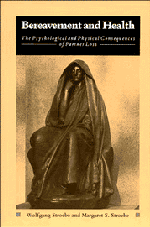Book contents
- Frontmatter
- Contents
- Preface
- 1 Introduction
- 2 The symptomatology of grief
- 3 Is grief universal? Cultural variations in the emotional reactions to loss
- 4 Depression models of grief
- 5 Stress models of grief
- 6 Mediators between stress and illness
- 7 The loss effect: health consequences of marital bereavement
- 8 Risk factors in bereavement outcome
- 9 Reducing the risk of poor bereavement outcome
- References
- Author index
- Subject index
1 - Introduction
Published online by Cambridge University Press: 03 May 2010
- Frontmatter
- Contents
- Preface
- 1 Introduction
- 2 The symptomatology of grief
- 3 Is grief universal? Cultural variations in the emotional reactions to loss
- 4 Depression models of grief
- 5 Stress models of grief
- 6 Mediators between stress and illness
- 7 The loss effect: health consequences of marital bereavement
- 8 Risk factors in bereavement outcome
- 9 Reducing the risk of poor bereavement outcome
- References
- Author index
- Subject index
Summary
The broken heart: fact or folklore?
Most people can think of instances from their own experience, or from sources such as literature, drama, or folklore, of people suffering from “a broken heart” or from “a lack of the will to live” following the death of a loved person. The epitaph by Sir Henry Wootton succinctly expresses this sentiment:
He first deceased; she for a little tried
To live without him; liked it not, and died.
Thus, the notion of the broken heart seems to be more than a metaphor. Clearly, the view is held that grief can affect physical health and that death may occur during bereavement as a direct result of the sadness and anguish over the loss of a person whom one loved and to whom one was close.
Over the centuries, allusions to grief as a causal factor in disease and death have been frequent and have come from very diverse sources. As early as the eighth century b.c., in the writings of the legendary epic poet Homer, we find reference to the notion that grief alone can kill. Homer described the visit of the wandering Odysseus to the Kingdom of the Dead and the brief reunion with his deceased mother, who related to him the following account of her own death:
It was not that the keen-eyed Archeress sought me out in our home and killed me with her gentle darts. Nor was I attacked by any of the malignant diseases that so often make the body waste away and die. […]
- Type
- Chapter
- Information
- Bereavement and HealthThe Psychological and Physical Consequences of Partner Loss, pp. 1 - 6Publisher: Cambridge University PressPrint publication year: 1987



